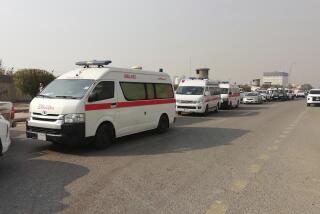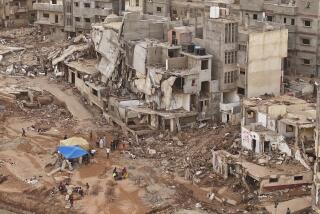U.S. finds no organized Al Qaeda presence in Libya opposition, officials say
Despite fears that Islamic extremists may be playing a hidden role in the rebellion against Moammar Kadafi, the U.S. intelligence community has found no organized presence of Al Qaeda or its allies among the Libyan opposition, American officials say.
A U.S. intelligence-gathering effort that began shortly after anti-Kadafi forces started seizing towns in eastern Libya last month has not uncovered a significant presence of Islamic militants among the insurgents.
“We’re keeping an eye out for extremist activity in Libya, but we haven’t seen much, if any, to date,” said a U.S. counter-terrorism official. A Defense official added that the U.S. had not seen a direct link between the opposition and extremists.
Photos: A meeting with prisoners held by rebels in Libya
A congressional staffer who receives intelligence briefings did not dispute those assessments. But the aide added: “There ought to be a concern and recognition that there may be such a linkage. There should also be an appreciation that the opposition is not a uniform, monolithic movement.”
Eastern Libya has a history as a breeding ground for Islamic militants. U.S. officials say more than 100 Libyans entered Iraq to fight in the anti-U.S. insurgency between August 2006 and August 2007. The vast majority came from Benghazi, the rebels’ de facto capital, and nearby Derna.
The Obama administration is concerned about long-term instability that could allow extremism to take root, and is sensitive to any suggestion that Al Qaeda, which has long opposed Kadafi, could somehow benefit from the U.S.-led international military effort in Libya.
On Feb. 24, Al Qaeda in the Islamic Maghreb, a North African affiliate of the group, vowed to “do whatever we can” to help the Libyan rebels, according to a statement translated by SITE Intelligence Group, a Washington-based company that tracks militant websites.
Kadafi has repeatedly claimed that the insurgents are dominated by Al Qaeda, a charge strongly denied by opposition leaders in eastern Libya, an area that has long opposed Kadafi.
Islamic fundamentalists clearly are among the rebels, but no organized segment is pursuing a Taliban-style government or an Al Qaeda agenda, Libya experts say.
“Who is behind the revolution? It’s not the Islamists or the jihadists,” said Noman Benotman, a former Libyan militant now with the Quilliam Foundation, a London-based group staffed by former Islamic radicals. “It’s ordinary people, moderates, liberals, lawyers and writers.”
“There’s no evidence that any of the leaders are extremists, and to the extent that we know anything, they seem to be secular professionals,” said Robert Pape, a terrorism expert at the University of Chicago who has traveled to Libya.
Charles Faddis, who led a CIA team in northern Iraq before the 2003 invasion, and who retired in 2008, questioned whether the U.S. intelligence community really understands who the rebels are.
“Everyone wants to believe the opposition consists of individuals dedicated to a democratic revolution,” Faddis said. “Is that true?”
“Is this a political movement or a tribal one? What we need is solid intelligence on the nature of the opposition, who the key figures are, who is going to emerge on top. I suspect we do not have that, because our collection inside Libya, a denied area, has probably been very weak for a very long time.”
A Libyan journalist in Derna said in an interview last week that Islamic militants were seeking influence in that city. “In the beginning I was very optimistic about the possibility of reform and change, but there has been a violent takeover and now we are seeing foreign fighters, Islamists, from the Gulf and other Arab countries,” said Milad Hassani.
The large number of Libyans who went to fight in Iraq is less an indication of a large extremist community than a social network that could be activated in a short period of time, said Brian Fishman, a terrorism expert who analyzed captured documents about the Libyan fighters for the U.S. Military Academy at West Point.
Secretary of State Hillary Rodham Clinton said at a Senate committee hearing on March 2 that the U.S. should not let Libya slide into Somalia-like chaos and possibly create fertile ground for extremist ideologies to spread.
Photos: A meeting with prisoners held by rebels in Libya
Special correspondent Meris Lutz in Beirut contributed to this report.
More to Read
Start your day right
Sign up for Essential California for news, features and recommendations from the L.A. Times and beyond in your inbox six days a week.
You may occasionally receive promotional content from the Los Angeles Times.







